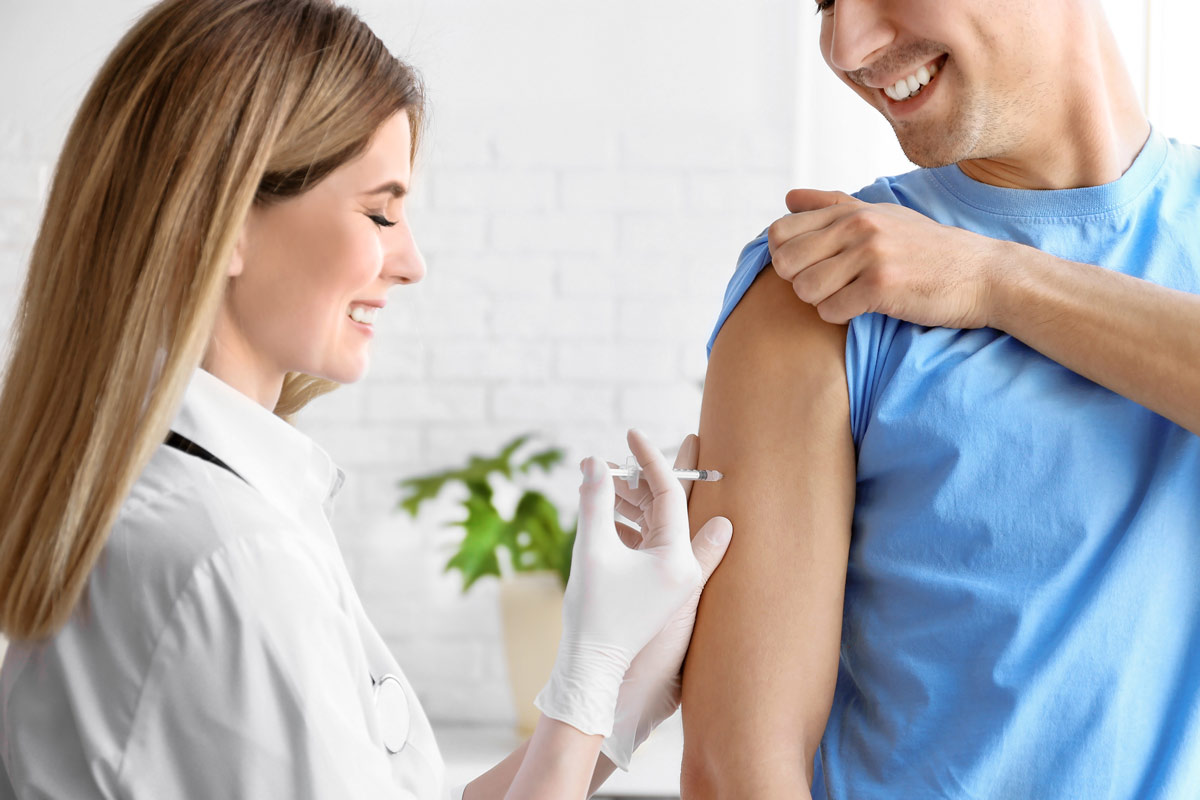Vaccinations
Travel medical advice
Travel medical advice

Nowadays, people travel to all countries of the world almost all year round. However, not everywhere you can find the same or similar environmental or hygienic conditions as in our region, in Central Europe. A travel to distant countries can be accompanied by serious consequences for health and sometimes causes a profound impact on life. I offer extensive advice on all aspects of your health for traveling to other countries, no matter if it is a professional or private the trip. Whether it’s checking and completing your vaccination coverage or malaria protection. I give helpful tips and advice and I will be happy to advise you, especially on the following topics:
- Which vaccinations are necessary or useful; e.g. whether you should protect yourself against yellow fever or hepatitis A, or whether a tick vaccination is advisable.
- What country-specific health risks there are to consider. Whether, for example, malaria occurs in the chosen destination, and how to protect against it.
- Information about the various travel diseases and protection if, for example, dengue fever or tuberculosis occurs in theselected selected country.
- Of course, the travel medical consultation also informs you about current risks, such as bird flu or SARS.
Risks and dangers that are often not considered!
UV radiation & sunburn, injuries from contact with jellyfish or injuries from corals….
Contact with tropical bacteria, injuries from snakes or scorpions, malaria yellow fever and much more…
Altitude sickness or acute mountain sickness, oxygen saturation. Problems with breathing, heart and circulation.
In faraway countries and especially at high temperatures, unpleasant surprises can occur.

Enjoy your dreams
Vacation – should remain the most beautiful time of the year. This makes it all the more important to be prepared, informed and protected. It is always enriching for mind, body and soul to break out of our usual environment and travel.
Especially Long-distance trips are becoming more and more popular and attract visitors with exciting experiences. Therefore it is even more important to obtain extensive informations about the vacation destination before getting on a trip. After all, you meets foreign cultures, encounters exotic plants, gets to know interesting animals and, last but not least, the climate is usually a decisive reason to escape our latitudes.
But the very thing that fascinates us about these destinations also imposes some dangers. And the better you know these risks, the better you can avoid them – and the more you can relax and enjoy your vacation.
There are diseases abroad that we are not even aware of. Therefore, any long-distance traveler who has no relevant experience yet should seek medical advice in advance.
Individual advice
In order to make the travel medical consultation as detailed as possible, it is helpful to clarify the following questions in advance in order to simplify the consultation.
- Pregnancy or known chronic pre-existing conditions
- existing basic immunization (vaccination) according to vaccination certificate
- Destination and travel route (countries / cities / regions traveled)
- Travel dates
- Type of trip (backpacking/individual trip or stay in cities/tourist centers with organized excursions, medium to upscale package tour or stay in major cities/tourist centers, upscale package tour or business trip).
- Which means of transport are used? Plane, train, car, ship – possibly also combined?
- Vacation activities? E.g. diving and/or mountaineering

Vaccinations and vaccination advice
Vaccinations effectively protect against some infectious diseases. Here you can learn which vaccinations are available and how they work.

What vaccinations do you need?
Some protective vaccinations, the so-called standard vaccinations, should be carried out, if possible, by every person who has not already gone through the disease or who cannot be vaccinated for health reasons. In many cases, they protect not only the individual, but also people in the environment who are particularly at risk or who cannot be vaccinated.
Certain specific professions, but also older people and people with pre-existing conditions, as well as pregnant women, need special protection. They often become more seriously ill with certain infections or have a higher risk of infection. That’s why doctors advise them to get vaccinations that other people don’t necessarily need. Doctors refer to this as an indication vaccination.
Pregnant women
need special protection
Certain professions
… are exposed to major risks
Older people
…have a higher risk of infection
Frequently Asked Questions & Interesting Information
Vaccinations from A to Z: Which excist?
There are a number of protective vaccinations against infectious diseases. Some of them are recommended for everyone, some for special risk groups and some only for certain trips. The following list will tell you what vaccinations are available.
- Cholera vaccination
- Dengue fever vaccination
- Diphtheria vaccination
- TBE vaccination
- Yellow fever vaccination**
- Flu vaccination
- Shingles (Herpes Zoster) Vaccination
- HPV vaccination
- Haemophilus influenzae type b vaccination (Hib)
- Hepatitis vaccination
- Japanese encephalitis vaccination
- Whooping cough vaccination
- MMR vaccination
- Malaria prophylaxis
- Measles vaccination
- Meningococcal vaccination
- Mumps vaccination
- Pneumococcal vaccination
- Polio vaccination
- Rotavirus vaccination
- Rubella vaccination
- Tetanus vaccination
- Rabies vaccination
- Tuberculosis vaccination
- Typhoid vaccination
- Chickenpox vaccination
- Tick vaccination
**We do not do yellow fever vaccinations ourselves
Flu vaccination: to whom is it important?
Chronically ill
Some chronically ill people fear overloading their weakened bodies with a flu shot. But it is precisely for them that influenza can be dangerous. That is why the Standing Commission on Vaccination (STIKO) recommends, among others, that all heart patients, diabetics, and people with chronic kidney or liver disease get vaccinated. In cancer patients, vaccination should be given no earlier than three months after chemotherapy.
Children: What vaccinations does my child need?
Newborns receive immune protection from their mothers against many infectious diseases. However, it is already lost in the first few weeks. However, because even young children can become seriously ill from an infectious disease, experts recommend initial protective vaccinations at an early age.
Pregnancy: Which vaccinations are important now?
If you are pregnant or planning to have a baby, several vaccinations are especially important. This protects you, for example, from diseases for which pregnant women have an increased risk of a severe course. However, a vaccination in time protects your child from harm. I will be happy to advise you in detail which vaccinations are advisable and allowed during pregnancy.
How to vaccinate?
Usually, the doctor inoculates with an inlection syringe into the upper arm muscle (deltoid muscle). With infants and young children, pediatricians like to choose a thigh muscle (vastus lateralis muscle). Vaccinations into the muscle (intramuscular) are common for both live and dead vaccines.
However, some live vaccines can also be taken orally and swallowed. These oral vaccines are available against rotavirus or typhoid, for example. There is also a live vaccine against the “real” flu that can be absorbed through the nose. This nasal vaccination is a good alternative to the classic injection, especially for children.
How do vaccinations work?
The classical vaccinations are so-called active immunizations. They use the body’s immune memory. For a protective vaccination, the physician injects attenuated or killed pathogens or only certain building blocks thereof. The body then produces antibodies and memory cells. This will prompt the immune system to respond much as it would have on its first reaction to the actual pathogen.
Active immunization is contrasted with passive immunization. In this process, physicians directly gives administer antibodies against a specific pathogen. They come for example from people who have already gone through the disease. The antibodies provide first aid to ward off an acute infection: they help immediately if someone has already become infected. However, passive vaccination does not cause a long-term immune protection.
If the doctor give administers a passive and an active vaccination at the same time, it is called simultaneous vaccination. The active portion makes sense only with inactivated vaccines, since passive immunization would greatly weaken the effect of a live vaccination. Vaccination trains our immune system and does not make us sick.
Vaccination intervals: What to watch out for?
Many vaccinations can be given at the same time. This may even make the immune response stronger. Therefore, the most important ones are usually offered as combination products.
However, when vaccines are not given at the same time, certain intervals must be kept in-between the individual vaccinations (at least four weeks in each case). Only this way the immune protection can develop accordingly. If such vaccinations are too close in time, the vaccination protection will be weaker. This excludes orally administered living vaccines, so-called oral vaccines. Vaccinations with inactivated vaccines also do not require a time interval between vaccinations.
Passive immunization or therapeutic immunoglobulin givings are special cases. The antibodies contained can also inactivate live vaccines. Therefore, after a passive vaccination, physicians wait several months before they give a live vaccination. The exact interval depends on what kind of antibodies (immunoglobulins) were given, in what dose, and in what form (intramuscular or intravenous).
On the ontrary, if you receive immunoglobulins or passive immunization within the two weeks following an active live immunization, it may interfere with building vaccine protection. In this case the vaccination would have to be repeated later.
Basic immunization, booster vaccination - when am I protected?
For some vaccines, one or more childhood vaccinations are sufficient to provide lifelong protection. For others, this basic immunization must be refreshed regularly throughout life. Therefore, for each vaccination there is a specific vaccination schedule that specifies the number of vaccinations for basic immunization and the need and timing of a booster vaccination.
An incomplete basic immunization can be completed even years later. Experts then speak of a catch-up vaccination. As a rule, you do not need to start all over again. You can also catch up on a missed booster vaccination after a longer period of time without any problems. However, the longer you wait to do this, the higher the risk that you will no longer be adequately protected.
If you are unsure if you have been vaccinated, you can have the basic immunization completed. Even if you unknowingly already have vaccination protection, an additional vaccination will not hurt. Alternatively, for some conditions, the doctor can determine if you are protected based on a blood test. In the process, he determines the so-called vaccination titer.
ngs.
How are vaccines produced?
The development and production of vaccines is costly. The regulatory authorities place the highest standards on the safety of vaccinations, becouse vaccinations are given to healthy people. Thereby a distinction is made between different types of vaccines.
Live vaccines
contain attenuated pathogens. They can multiply but no longer cause disease in people with healthy immune systems.
Inactivated vaccines
contain killed pathogens, their fragments of these or harmless pathogen toxin. They are also unproblematic for immunocompromised people. Depending on the exact structure, scientists distinguish:
- Whole-particle vaccines
- Split vaccines (conjugate vaccines or polysaccharide vaccines)
- Toxoid vaccines
- Adsorbate Vaccines
Recombinant vaccines are vaccines produced by genetic engineering. They contain only one particularly typical building block of a pathogen (subunit) that is sufficient for the immune response (antigen). Some experts refer to the insertion of so-called vector viruses (viruses that are alive but do not cause disease) with the typical component of the pathogen (against which vaccination is to be given) as a recombinant live vaccine.
Is vaccination dangerous?
Vaccination activates the immune system. Redness at the vaccination site or even fatigue and some fever are signs that the vaccination is working. However, some people worry whether vaccination can cause greater harm to them or their child.
It is true that, as with any effective medication, side effects can also occur with vaccinations. However, only in individual cases these are classified as severe in individual cases. The risk of permanent or fatal consequences from the disease itself is many times higher!
Make your appointment online today….






